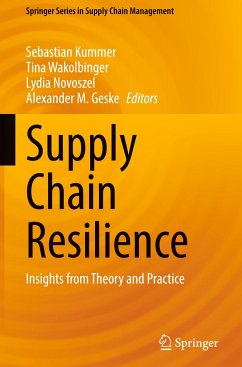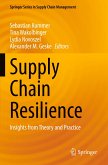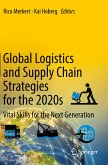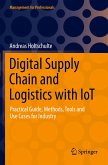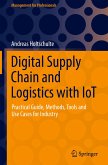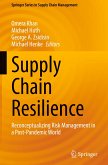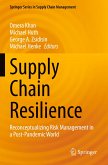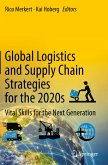Supply Chain Resilience
Insights from Theory and Practice
Herausgegeben:Kummer, Sebastian; Wakolbinger, Tina; Novoszel, Lydia; Geske, Alexander M.
Supply Chain Resilience
Insights from Theory and Practice
Herausgegeben:Kummer, Sebastian; Wakolbinger, Tina; Novoszel, Lydia; Geske, Alexander M.
- Gebundenes Buch
- Merkliste
- Auf die Merkliste
- Bewerten Bewerten
- Teilen
- Produkt teilen
- Produkterinnerung
- Produkterinnerung
Every global crisis highlights the strategic importance of industrial and non-profit supply chains for society. In terms of coping with unforeseen and unpredictable events, supply chain resilience enables the parties and networks involved to stay successful during and after the disruption. Furthermore, a resilient supply chain contributes to the sustainable competitive advantage of the entire value chain.
Written by scholars and practitioners alike, this book not only puts forward a new framework for resilience in supply chain management, but also presents best practice cases from various…mehr
Andere Kunden interessierten sich auch für
![Supply Chain Resilience Supply Chain Resilience]() Supply Chain Resilience38,99 €
Supply Chain Resilience38,99 €![Global Logistics and Supply Chain Strategies for the 2020s Global Logistics and Supply Chain Strategies for the 2020s]() Global Logistics and Supply Chain Strategies for the 2020s38,99 €
Global Logistics and Supply Chain Strategies for the 2020s38,99 €![Digital Supply Chain and Logistics with IoT Digital Supply Chain and Logistics with IoT]() Andreas HoltschulteDigital Supply Chain and Logistics with IoT49,99 €
Andreas HoltschulteDigital Supply Chain and Logistics with IoT49,99 €![Digital Supply Chain and Logistics with IoT Digital Supply Chain and Logistics with IoT]() Andreas HoltschulteDigital Supply Chain and Logistics with IoT67,99 €
Andreas HoltschulteDigital Supply Chain and Logistics with IoT67,99 €![Supply Chain Resilience Supply Chain Resilience]() Supply Chain Resilience134,99 €
Supply Chain Resilience134,99 €![Supply Chain Resilience Supply Chain Resilience]() Supply Chain Resilience134,99 €
Supply Chain Resilience134,99 €![Global Logistics and Supply Chain Strategies for the 2020s Global Logistics and Supply Chain Strategies for the 2020s]() Global Logistics and Supply Chain Strategies for the 2020s80,24 €
Global Logistics and Supply Chain Strategies for the 2020s80,24 €-
-
-
Every global crisis highlights the strategic importance of industrial and non-profit supply chains for society. In terms of coping with unforeseen and unpredictable events, supply chain resilience enables the parties and networks involved to stay successful during and after the disruption. Furthermore, a resilient supply chain contributes to the sustainable competitive advantage of the entire value chain.
Written by scholars and practitioners alike, this book not only puts forward a new framework for resilience in supply chain management, but also presents best practice cases from various areas and industries. As a particular highlight, it includes a Delphi study that gathers state-of-the-art insights from supply chain leaders.
In addition to practical approaches, methods and tools, the book also offers food for thought on the future of supply chain resilience. As such, it offers a valuable resource for current and future managers in the public and private sector, aswell as researchers and students engaged in this field.
Written by scholars and practitioners alike, this book not only puts forward a new framework for resilience in supply chain management, but also presents best practice cases from various areas and industries. As a particular highlight, it includes a Delphi study that gathers state-of-the-art insights from supply chain leaders.
In addition to practical approaches, methods and tools, the book also offers food for thought on the future of supply chain resilience. As such, it offers a valuable resource for current and future managers in the public and private sector, aswell as researchers and students engaged in this field.
Produktdetails
- Produktdetails
- Springer Series in Supply Chain Management 17
- Verlag: Springer / Springer International Publishing / Springer, Berlin
- Artikelnr. des Verlages: 978-3-030-95400-0
- 1st edition 2022
- Seitenzahl: 368
- Erscheinungstermin: 25. September 2022
- Englisch
- Abmessung: 241mm x 160mm x 26mm
- Gewicht: 717g
- ISBN-13: 9783030954000
- ISBN-10: 3030954005
- Artikelnr.: 63150732
- Herstellerkennzeichnung
- Springer-Verlag GmbH
- Tiergartenstr. 17
- 69121 Heidelberg
- ProductSafety@springernature.com
- Springer Series in Supply Chain Management 17
- Verlag: Springer / Springer International Publishing / Springer, Berlin
- Artikelnr. des Verlages: 978-3-030-95400-0
- 1st edition 2022
- Seitenzahl: 368
- Erscheinungstermin: 25. September 2022
- Englisch
- Abmessung: 241mm x 160mm x 26mm
- Gewicht: 717g
- ISBN-13: 9783030954000
- ISBN-10: 3030954005
- Artikelnr.: 63150732
- Herstellerkennzeichnung
- Springer-Verlag GmbH
- Tiergartenstr. 17
- 69121 Heidelberg
- ProductSafety@springernature.com
Prof. Sebastian Kummer is Head of the Institute for Transport and Logistics Management at the Vienna University of Economics and Business (Austria) and an Endowed Chair Professor at the Jilin University in Changchun (China). In addition to being responsible for program development and teaching in the fields of transportation, logistics and supply chain management, he has coordinated numerous successful research and practical projects for industrial and commercial companies, and for transport and logistics service providers. He has supported numerous transport and logistic tenders. He is the author or editor of more than 180 publications, including leading textbooks. Prof. Tina Wakolbinger is Head of the Research Institute for Supply Chain Management and Deputy Head of the Institute for Transport and Logistics Management at the Vienna University of Economics and Business (Austria). Her research interests lie in the modeling and analysis of complex decision-making in network systems with a specific focus on global issues. She is especially interested in social and knowledge networks, global transportation and telecommunication networks, financial networks, humanitarian logistics and closed-loop supply chains. Lydia Novoszel is a Research Associate at the Institute of Transport and Logistics Management at the Vienna University of Economics and Business (Austria). Following an international professional career in supply chain management, she decided to investigate current logistics challenges from an academic perspective. She holds degrees in both mechanical engineering and business administration. Alexander Maximilian Geske is a Research Associate at the Institute of Transport and Logistics Management at the Vienna University of Economics and Business (Austria). He holds a bachelor's degree in international business administration and a master's degree in supply chain management. Thanks to his previous professional career in the transportation industry, he successfully combines practical and academic perspectives.
Part I: Supply Chain Disruptions and Resilience.- 1. Definition and Development of Supply Chain Resilience.- 2. Supply Chain Resilience: A Decade of Evolvement.- 3. Supply Chain Resilience Framework.- 4. Supply Chain Challenges During the COVID-19 Pandemic.- 5. Pandemic-Related Disruptions in the Field of Freight Transportation.- 6. Modern Slavery and Working Conditions in the European Trucking Industry: A Growing Threat to Supply Chain Resilience.- Part II: Measuring Resilience.- 7. Enhancing Supply Chain Resilience Through Incorporating Business Continuity Management Systems.- 8. Measuring and Fostering Supply Chain Resilience in the Humanitarian Context.- 9. The Value of Artificial Intelligence for More Resilient Supply Chains.- 10. Applying Blockchain Technologies for Increasing Supply Chain Resilience.- Part III: Achieving Resilience.- 11. Policy Options for Strengthening Resilience to Achieve Strategic Autonomy for Austria in a Disrupted World.- 12. Managing Supply Chain Resilience for Sustainability in an Uncertain World: Challenges and Solutions.- 13. Supply Chain Resilience in the Fourth Industrial Revolution.- 14. Resilient Supply Chain Network Design: An Overview of Optimization Models.- Part IV: Resilience in Theory and Practice.- 15. Resilient Supply Chains: A Practical Guide for Successful Implementation.- 16. What Really Works: A Practitioner's Critical Review on Supply Chain Resilience Research.- 17. Delphi Study on Supply Chain Resilience.- Part V: Supply Chain Resilience in Different Functional Areas.- 18. Commodity Price Risks: Strategies to Increase Supply Chain Resilience.- 19. Achieving Supply Chain Resilience Through Additive Manufacturing.- 20. Resilience in Warehousing.- 21. How to Successfully Master a Pandemic in a Global Distribution Network?.- 22. Resilience Strategies for Freight Transportation: An Overview of the Different Transport Modes Responses.- 23. Thoughts About Individual Resilience Impact to Team and Organization.- Part VI: Supply Chain Resilience in Different Industries.- 24. Resilient Supply Chains in the Parcel Shipping Sector.- 25. Deep Dive on Resilience in the Aviation Industry: Between Resilience for Short-Term Disruptions and Focus on Long-Term Preparedness.- 26. Semiconductor Supply Chain: A 360-Degree View of Supply Chain Risk and Network Resilience Based on GIS and AI.- 27. Ways to Build Resilient Inbound Transportation Logistics in the Automotive Industry.- 28. Overview of the Enablers of Humanitarian Supply Chain Resilience.- 29. Resilience and Military Supply Chain Management.- 30. Concluding Remarks.
Part I: Supply Chain Disruptions and Resilience.- 1. Definition and Development of Supply Chain Resilience.- 2. Supply Chain Resilience: A Decade of Evolvement.- 3. Supply Chain Resilience Framework.- 4. Supply Chain Challenges During the COVID-19 Pandemic.- 5. Pandemic-Related Disruptions in the Field of Freight Transportation.- 6. Modern Slavery and Working Conditions in the European Trucking Industry: A Growing Threat to Supply Chain Resilience.- Part II: Measuring Resilience.- 7. Enhancing Supply Chain Resilience Through Incorporating Business Continuity Management Systems.- 8. Measuring and Fostering Supply Chain Resilience in the Humanitarian Context.- 9. The Value of Artificial Intelligence for More Resilient Supply Chains.- 10. Applying Blockchain Technologies for Increasing Supply Chain Resilience.- Part III: Achieving Resilience.- 11. Policy Options for Strengthening Resilience to Achieve Strategic Autonomy for Austria in a Disrupted World.- 12. Managing Supply Chain Resilience for Sustainability in an Uncertain World: Challenges and Solutions.- 13. Supply Chain Resilience in the Fourth Industrial Revolution.- 14. Resilient Supply Chain Network Design: An Overview of Optimization Models.- Part IV: Resilience in Theory and Practice.- 15. Resilient Supply Chains: A Practical Guide for Successful Implementation.- 16. What Really Works: A Practitioner's Critical Review on Supply Chain Resilience Research.- 17. Delphi Study on Supply Chain Resilience.- Part V: Supply Chain Resilience in Different Functional Areas.- 18. Commodity Price Risks: Strategies to Increase Supply Chain Resilience.- 19. Achieving Supply Chain Resilience Through Additive Manufacturing.- 20. Resilience in Warehousing.- 21. How to Successfully Master a Pandemic in a Global Distribution Network?.- 22. Resilience Strategies for Freight Transportation: An Overview of the Different Transport Modes Responses.- 23. Thoughts About Individual Resilience Impact to Team and Organization.- Part VI: Supply Chain Resilience in Different Industries.- 24. Resilient Supply Chains in the Parcel Shipping Sector.- 25. Deep Dive on Resilience in the Aviation Industry: Between Resilience for Short-Term Disruptions and Focus on Long-Term Preparedness.- 26. Semiconductor Supply Chain: A 360-Degree View of Supply Chain Risk and Network Resilience Based on GIS and AI.- 27. Ways to Build Resilient Inbound Transportation Logistics in the Automotive Industry.- 28. Overview of the Enablers of Humanitarian Supply Chain Resilience.- 29. Resilience and Military Supply Chain Management.- 30. Concluding Remarks.

